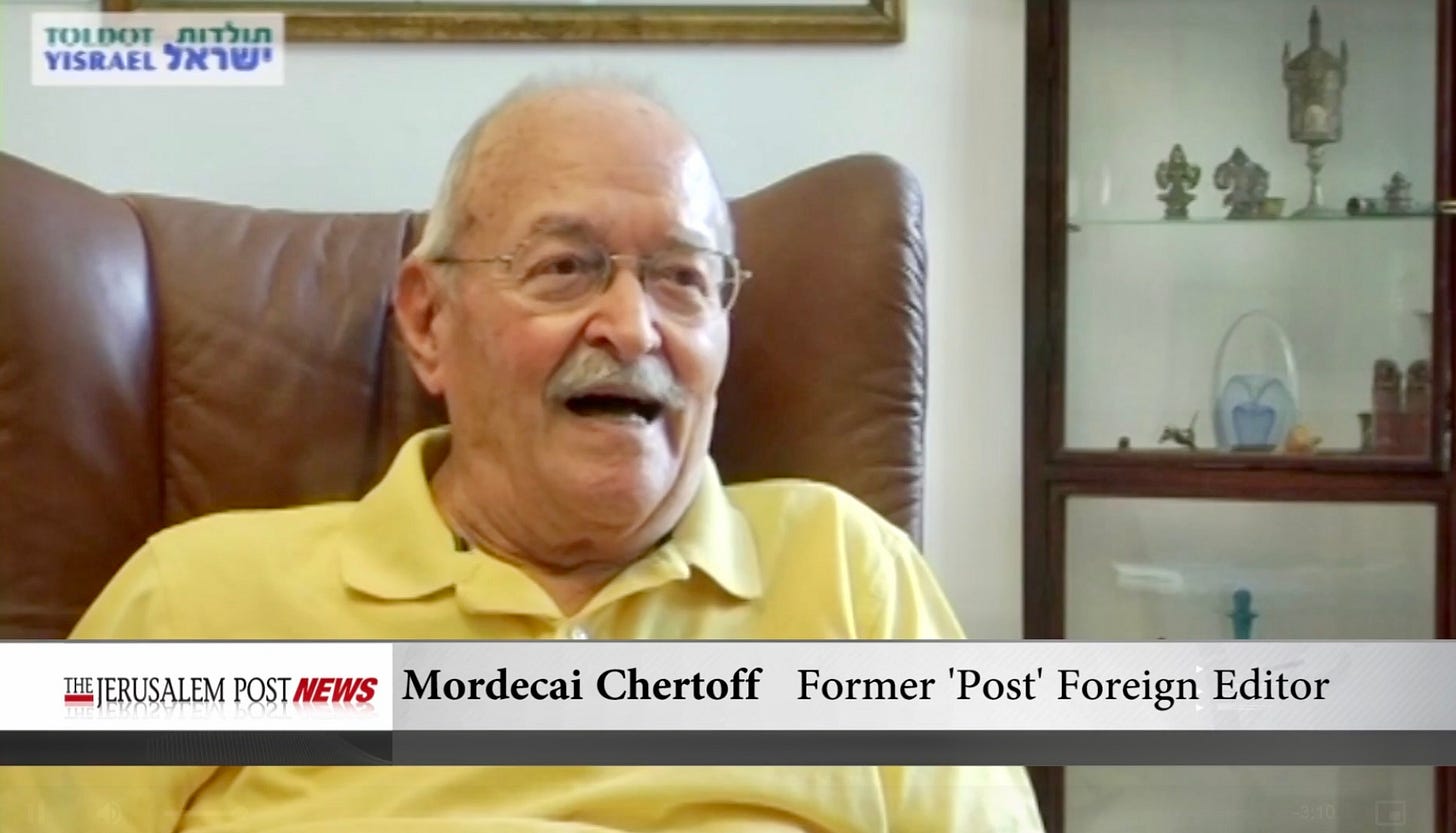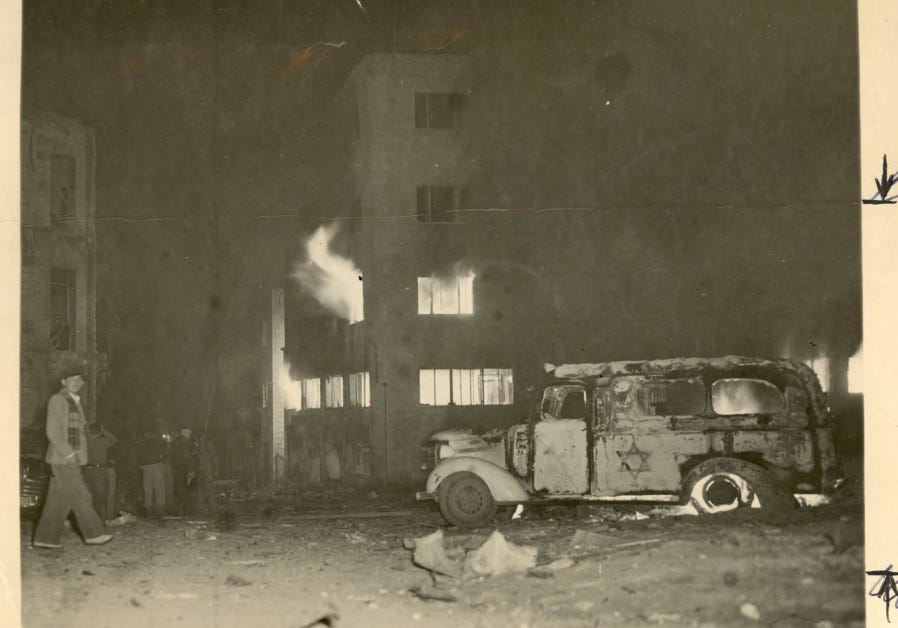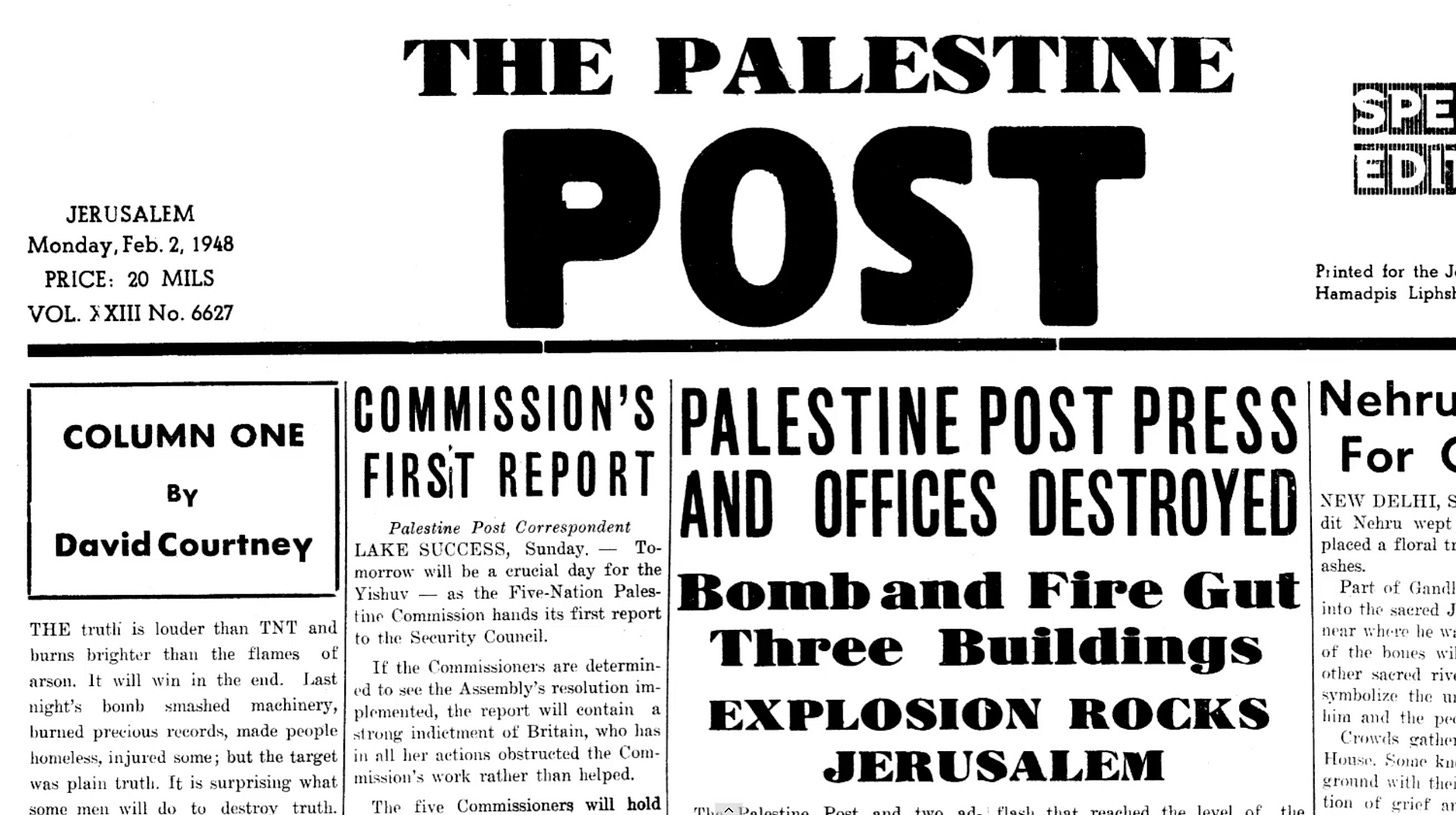The Storytellers Who Struck Back
"If the bombers’ objective was to scare the Jewish press into silence; they massively underestimated their targets."
By Michael Golden

The bomb fragment that was speeding toward Mordecai Chertoff’s head ended up buried inside the book he was reading. It likely saved his life. Others in the newsroom at The Palestine Post were not so lucky.
The assault happened 76 years ago today, February 1, 1948, — just months before Israel would declare Independence. Two years later, the English-language newspaper would rename itself the The Jerusalem Post. It is still reporting on the world today — quite possibly because of what happened immediately following the attack.
It was a Sunday; traditionally a slower news day. In fact, that’s why Chertoff was at his desk with Moby Dick instead of downstairs working on headlines before the paper went to press.
At 11pm, two men in a stolen British Army truck carrying half a ton of dynamite parked in front of the Post along Hasolel Street. A moment later, the driver of a second vehicle pulled up, jumped out, lit the fuse, then fled. Chertoff, the foreign editor at the time, says everyone immediately knew that the paper’s editorial office was the target of the attack.
Flames streamed up the walls of the newsroom and the fire was soon burning on both sides of the street (video). Tenants in the building began evacuating, but some on upper floors were forced to jump from their balconies.
Chertoff went down to the press room, where he says he could hear the pained voice of one of the typesetters.
“We got the guy onto a table, a door, and carried him across the street to the hospital. They got him home, but a few weeks later, he died. He didn’t make it.”
Two others from the Post would lose their lives from injuries sustained during the explosion. The bombers were never captured. Arab leader Abd al-Kadir al-Husseini claimed responsibility for the terrorist act, but many still believe that two British Army deserters were involved. According to historian Uri Ulstein, the explosive was designed by a man named Fawzi el-Kutub — who was trained by the Nazis.
Fighting between the Arabs and Jews had been going on for months. But if the bombing was an effort to stifle the Jewish press, its perpetrators underestimated their marks.
Amidst all of the chaos, Chertoff and Deputy Editor Ted Lurie met at Cafe Atara on Ben Yehuda street. As a few others arrived, Lurie’s wife Tzila comforted them with hot coffee and warm embraces. Then, Chertoff says, she got down to business:
“Tzila said, ‘All right, we’re putting out a paper.’ So the newspapermen came, shlepping typewriters, and we sat and wrote the paper from memory.”
When the bomb lit up the building earlier, veteran reporter Marlin Levin had the presence of mind to rip his unfinished copy out of his typewriter. Post historian Alexander Zvielli described how the team pulled together and worked through the night:
“Ted Lurie swiftly arranged for the lead story to be set at two other presses in town, and for the set-up pages to be brought to the rotary press by hand. Thus the Post appeared as usual in the morning. The edition was smaller, only two pages. But it was an important victory in the newspaper’s main objective — not to be silenced, even for a single day.”
Somehow, by the end of the week, the Post staff was back at full strength and more committed than ever. They had made good on the promise that columnist David Courtney wrote in his lead sentence on the morning after the assault:
“The truth is louder than TNT and burns brighter than the flames of arson. It will win in the end. Last night’s bomb smashed machinery, burned precious records, made people homeless, injured some; but the target was plain truth.”
In that sense, the bombing was a colossal failure. Muscle memory is a powerful thing; especially when exercised by a people whose past has cultivated the reflex to bounce back — and then some.
One generation after another.
**This article was inspired by our partner publication, DUST AND STARS. To get nuggets of Jewish history delivered to your inbox daily, sign up here!
Michael Golden is the Editor-in-Chief of JEWDICIOUS.
From unpacking history and politics to navigating the nuances of family and personal relationships to finding the human angle on sports and entertainment — plus our unsparing take on what’s happening in the Jewish world — the canvas at JEWDICIOUS is limitless! JOIN US!!








Hi Michael:
I really loved your article. Really put meat on the bones of Dust and Stars, and made the story come alive. It's remarkable how moving stories of real people "meeting their moment" and creating history can be. Looking forward to more.
All the best,
Steven